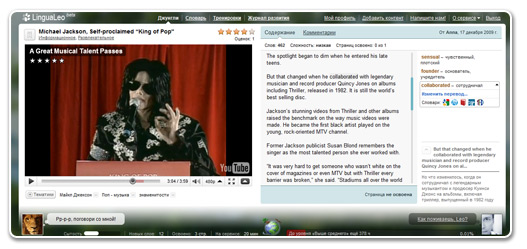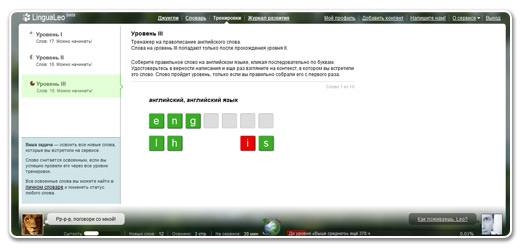The optimal model of monetization web service: what is it?

On the way of developing a start-up for learning English, LinguaLeo.ru , which we talked about in our blog , we faced a problem familiar to all start-ups: what should be the design of a business model and what should be the monetization of the web service.
So, the case. It is necessary to find the optimal monetization model using the example of a free-resource.
For those who do not read the description :
LinguaLeo.ru - web service for learning English online. The user specifies the current and desired levels of English, then, using the proposed methodology, masters new words and pages from the content of interest in one of three formats: video with text, audio with text, texts. Content is added by users to the “Jungle” section with an indication of genres and topics. After linguistic processing, the service allows you to select content by complexity, size, format, genre, topics, rating and date of addition. The user selects the material of interest and begins to master it. When you click on unfamiliar words, they are added to the personal dictionary along with the context of use. After working through one page, it can be marked as mastered, all familiar words will be added to the user's personal dictionary as “identified” to calculate the current vocabulary.

')
For new words added to the personal dictionary, you can go through one of three levels of training, in which the word, context, pronunciation and spelling are involved.
In the personal dictionary to any word additional information is given: transcription, sound, morphologically related words, grammatical information about the word, encountered usage contexts and frequency. All words have a mastering status that changes automatically (after training) or manually.
In the development log, the user observes the dynamics of progress in learning the language: the number of words on each status, vocabulary, the number of pages mastered, the forecast of the time to reach the target level, by day and total. Shows a graph of progress.

As a motivator and recommender, the user gets a pet - Tamagotchi Leo. Every day he wants to eat (learn new words and pages) and train (pass word training). The user makes the daily ration of Leo dependent on the intensity plan of the classes in the service.
Monetization. Why we chose freemium
Global view (C2B, B2B or B2C). We refused from advertising (including partner) models (it’s not worthwhile to distract with advertising when it comes to training). Commission is out of place (teachers would introduce for online classes is another matter). Burn investments in the hope of chance (C2B) - not the best style. The best visible alternative is to monetize the Freemium model for users (B2C, Free + Premium).
Current game rules for our Freemium model.
What is a freemium model in our case? To date, there are two solutions. One of them was sold on April 1st: when you activate your account, after registration, the user receives bonus meatballs. Meatballs "expand Leo's memory" and allow you to memorize more words per day. In the absence of meatballs, the user can not translate and add more than 20 words per day to the personal dictionary and for training. In the presence of meatballs - the user can add an unlimited number of words. Meatballs are “eaten up” by Leo's pet every day, one at a time. When bonus meatballs end, the user's choice is to limit to 20 new words a day, to buy or “earn” meatballs. Meatballs can be earned for each invited friend (5 each), or by adding new content (one at a time, but this opportunity has not yet been realized). You can buy one meatball for 30 rubles or a set of 7, 31, 95, 186 or 365 meatballs. Bulk more profitable (up to 11 rubles. For pieces). Payment through the service Robokassa. This option showed some flaws: it is inconvenient that the meatballs burn even when the user did not go to the service, and buying one at a time is not profitable! The optimal cost of one meatball is not obvious. Perhaps in a premium account (in the presence of meatballs) it would be nice to add additional features.
Future rules of the game for our Freemium model
The project team is considering alternative "rules of the game." There were proposals to limit the total number of words added to the personal dictionary (up to 500, for example). Slipped ideas that you can "sell" new words in excess of the free limit of forty kopecks per day from a personal account on the service. An option is offered to simply install two or three types of accounts with payment for an “improved” account for a fixed term. There are ideas that some other features of the service should be available only in the premium version. All of these options have their advantages and disadvantages.
The project team has planned the following changes to the rules of the game (unless better ideas are made):
- There are three “speeds of learning” words per day: up to 20 words, from 20 to 40 words, from 40 to infinity.
- When the limit is reached, you can manually or automatically switch the mastering rate (mastering rate can be called “Leo’s memory”, and changing it - “Leo’s memory expansion”). Switching to the day from the first to the second, as well as from the second to the third speed is given for 1 meatball. Switching is only valid for a day, always. When switching, you can put the flag "switch automatically when the limit is reached."
- Meatballs are sold as local currency, there are discounts for volume. Meatballs do not burn by themselves. They are “eaten up” by Leo only when memory is needed (switching speeds).
- Sometimes the Spirit of the Junley launches "Fricadell Rain" (the accrual of bonus meatballs, 3-5 pieces each). The fricadel rain comes about once a month and on holidays, as well as for achievements.
Problem
David Heinermann-Hennson (the creator of Ruby-on-Rails and several successful IT projects) says in a presentation at Startup School 08 that “the easiest way to monetize a useful IT resource for people is to charge a price for it” (as opposed to exotic monetization models) . In his presentation, he also gives examples of how this can be done (for a one-time action, by subscription, taking into account the volume and other options). In our case just need to correctly assign a price.
Case Criteria
First, the solution must be real and practical.
Secondly, the user must be satisfied with the rules of the game, everything must be clear to him, convenient and pleasant.
Thirdly, the solution should ensure sustainable monetization, development and growth of the project.
Tricky question
What should be the “rules of the game” with meatballs on the LinguaLeo.ru service in order to meet all three criteria, “do no harm” and ensure the project steady progress and development? The opinion of those who faced similar tasks, the opinion of active users of LinguaLeo.ru and other monetizable web services based on the Freemium model is interesting.
Source: https://habr.com/ru/post/92152/
All Articles